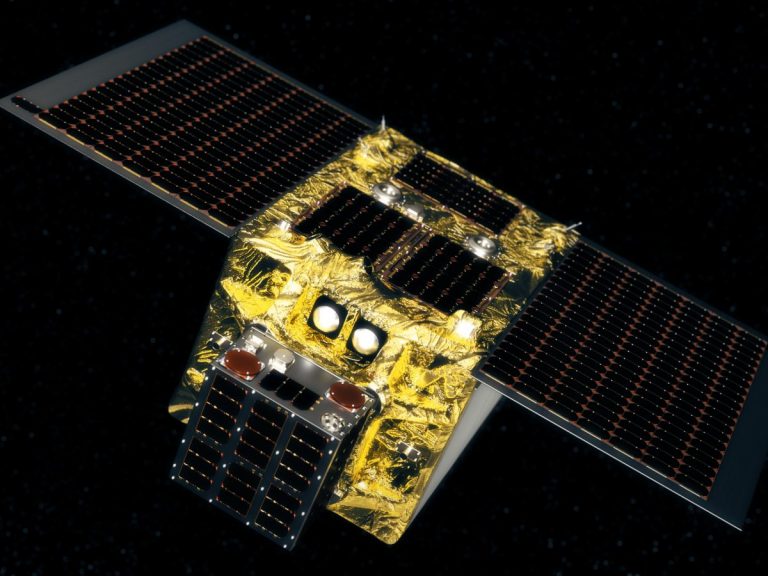アストロスケールが欧州宇宙機関と技術協力協定を締結
国際的なスペースデブリ除去会社アストロールが、欧州宇宙機関(ESA)との相互技術協力の意向を固める
宇宙飛行の長期的安全性を確保するために、宇宙ゴミ(デブリ)を除去するサービスの開発において業界をリードする、アストロスケールの英国拠点であるAstroscale UK Ltd.(以下、アストロスケール)は、デブリの衝突回避、デブリの環境モニタリング、モニタリング技術の開発において、ESAとデータおよび専門知識の共有を行うことに合意しました。
現在、地球軌道には1 cmを超えるデブリが75万個以上存在しています。生活に不可欠な通信や天気予報に使用されているような人工衛星にデブリが衝突すると、衛星が機能しなくなる可能性があります。デブリの主な発生源のひとつは、現在軌道上にある約3000の使われなくなった衛星と切り離された大型ロケットの上段部による爆発と分裂です。研究では、この状況は安定させることができることを示唆していますが、それは放置されたデブリを毎年約5つずつ、軌道から積極的に取り除かれなければならないことを意味します。
アストロスケールとESAの技術提携は、アストロスケールのデブリ除去実証プロジェクト「ELSA-d」に関連しています。 ELSA-dは、捕獲機(サービサー)とデブリを模擬した衛星(クライアント)の2基で構成され、この2基は打ち上げと軌道への初期配備時は結合しています。その後、チェイサーは分離され、ターゲットを捕獲する一連の作業を実施し、ランデブ・ドッキングおよび近接操作などのデブリ除去に必要な技術を実証します。
この合意に基づき、ESAはアストロスケールのELSA-d のサービサーが衝突する可能性を見極めます。これには、衝突回避操作における提案と適正審査が含まれます。ドイツのダルムシュタットにあるESAのスペースデブリオフィスが、ESA自体および他のヨーロッパのプロジェクトに似たようなサービスを提供しています。
また、ESAはELSA-dのクライアントとサービサーの追跡サポートを国際レーザー測距サービス(ILRS)に要請します。これにより、ILRSの追跡対象リストにELSA-dのクライアントとサービサーが追加されます。
アストロスケールは、実証衛星のサービサーとクライアントに、衛星のレーザー測距ができるリフレクターを搭載して、高精度の軌道決定を可能にし、最低1日2回のGPS測定を実現します。
英国アストロスケールの代表、ジョン・オーバーンは次のように述べています。「アストロスケールは、2020年前半に、先駆的な実証衛星『ELSA-d』の打ち上げを行いますが、いくつかの重要な技術分野でESAと協働できることを嬉しく思っています。 ELSA-dは約6か月間稼働する予定です。その期間に、私たちの軌道離脱(デオービット)技術の実証試験に加えて、有用な科学データを収集するできることは素晴らしいことです。
ELSA-dの計測器から収集された追加データは、アストロスケールとESAに重要な軌道と衛星操作の情報を提供します。」
この合意により、ESAは3回の観測期間にわたり、カメラにアクセスできるようになります。カメラは、視界を横切る小さなスペースデブリを検出する原理を検証するために使用されます。これにより、ESAは将来、大規模な光学機器を開発するのに使われる重要なデータを取得できます。ESAとアストロスケールは、観測方法の実現可能性についてさらに共同で検証し、有効なソリューションを特定します。
ESAはこのプロジェクトにおいて、ELSA-dで使用される飛行実証済みの地上管制ソフトウェア製品に関するサポートとアドバイスを提供します。これは主に、管制センターの設計書、構成(コンフィギュレーション)およびシステムの検証と実験に関するアドバイスです。
ELSA-dの詳細については、 以下のWebサイトをご覧ください。 www.astroscale.com
ESAのスペースデブリに関する活動の詳細については、以下をご覧ください。 www.esa.int / spacedebris
ESAの管制ソフトウェアの詳細については、以下をご覧ください。 www.esa.int / esaopssoftware

 米国のサイトにアクセス
米国のサイトにアクセス




